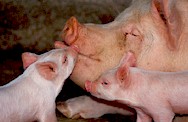Suifilaria suis is a filarial roundworm species that affects swine and wild boars. They are found mainly in southern Africa.
 It does not affect ruminants (cattle, sheep, etc.), horses, dogs or cats.
It does not affect ruminants (cattle, sheep, etc.), horses, dogs or cats.
Are pigs infected with Suifilaria suis contagious for humans?
- NO. The reason is that these worms are not human parasites.
You can find additional information in this site on the general biology of parasitic worms and/or roundworms.
Final location of Suifilaria suis
Predilection site of adult Suifilaria suis is the connective tissue below the skin and between the muscles.
Anatomy of Suifilaria suis
Adult Suifilaria suis are thread-like worms, about 4 cm long and 0.2 mm thick. As other roundworms the body of these worms is covered with a cuticle, which is flexible but rather tough. The worms have no external signs of segmentation.
They have a tubular digestive system with two openings. They also have a nervous system but no excretory organs and no circulatory system, i.e. neither a heart nor blood vessels. Males have two unequal spicules for attaching to the female during copulation.
The eggs are ovoid, approx. 30x55 micrometers, with a thin shell and contain an embryo.
Life cycle of Suifilaria suis
The life cycle of Suifilaria suis has not been elucidated yet. Adult females build nodule-like vesicles in the skin of the host. These nodules are full of eggs, which are released when the vesicles burst.
Harm caused by Suifilaria suis, symptoms and diagnosis
Infections with this worm are not pathogenic for pigs. They do not become sick and consequently show no particular clinical symptoms. However, the burst vesicles in the skin can become infected with secondary bacteria.
Diagnosis is based on the numerous hard nodules in the skin and connective tissue. These vesicles contain eggs and are different from those of Cysticercus cellulosae (pork bladder worm), which are filled with liquid and contain a scolex.
Prevention and control of Suifilaria suis
The life cycle being unknown, it is not possible to determine preventative measures that could reduce the parasite's population or the risk of infection for swine.
The use of anthelmintics is not indicated, and there are usually not medicines approved for the control of Suifilaria suis infections.
There are so far no true vaccines against Suifilaria suis. To learn more about vaccines against parasites of livestock and pets click here>.
Biological control of Suifilaria suis (i.e. using its natural enemies) is so far not feasible.
You may be interested in an article in this site on medicinal plants against external and internal parasites.
Resistance of Suifilaria suis to anthelmintics
So far there are no reports on resistance of Suifilaria suis to anthelmintics.
This means that if an anthelmintic fails to achieve the expected efficacy, chance is very high that either the product was unsuited for the control of Suifilaria suis, or it was used incorrectly.
|
Ask your veterinary doctor! If available, follow more specific national or regional recommendations for Suifilaria suis control. |